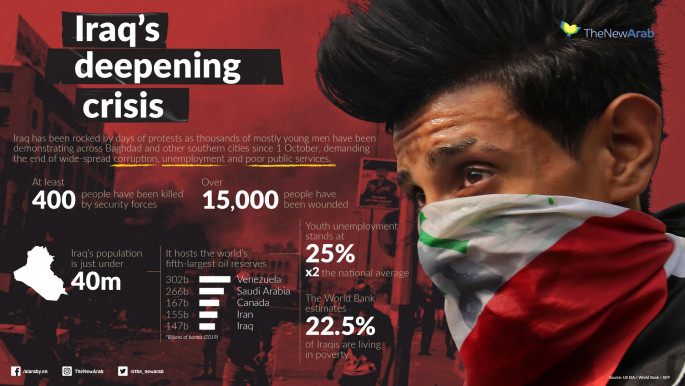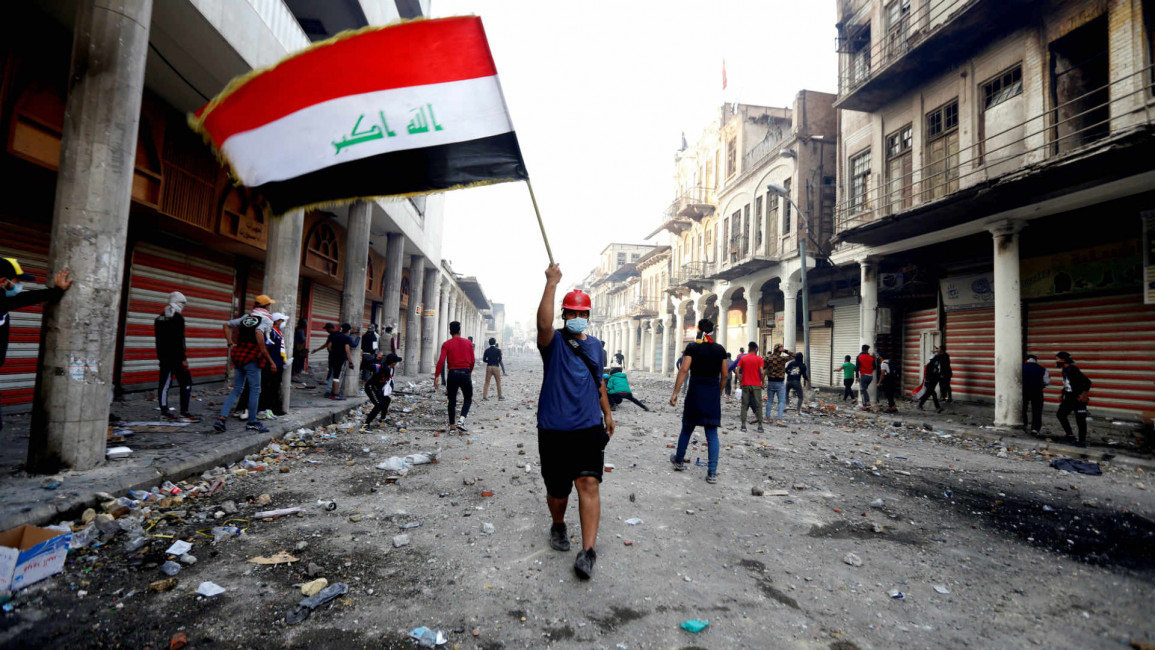'We are not safe': UN urges accountability over spate of kidnappings, assassinations in Iraq
The United Nations on Wednesday demanded the Iraqi government identify and hold responsible unknown groups targeting protesters with deliberate killings, abduction and arbitrary detention.
The damning UN report released on Wednesday comes amid a string of targetting assassinations, and abductions and arrests of civil activists and journalists that have fostered fear among protesters.
The report from the UN Assistance Mission in Iraq, based on 183 interviews conducted over the last month, called on the government to identify unknown groups targeting protesters and hold them accountable.
"UNAMI continues to receive credible allegations of deliberate killings, abduction and arbitrary detention carried out by unknown armed men described as 'militia', 'unknown third parties', 'armed entities,' 'outlaws' and 'spoilers'," the report said.
"The government must identify those groups responsible without delay and hold perpetrators accountable," the report continued. "Bearing the primary responsibility for the protection of its people, the state must spare no effort to protect the peaceful protesters from violence by armed actors operating outside state control as well as those with formal and informal reporting lines within the state."
The UN also said "credible information" indicated that high profile activists and journalists were being targeted for arrest by both Iraqi security forces and "groups described as 'militia'". At least five high-profile activists have recently gone missing, the report said.
"Outside Tahrir [Square], we are not safe," Ahmed, a protester who did not provide his last name fearing reprisal, told the Associated Press. "We know these kidnappings and killings are being done by these militia groups to scare us and make us leave."
The report came one day after the assassination of Ali Najm al-Lami, who was kidnapped from Tahrir Square, the epicenter of the protest movement, and found dead with a gunshot wound to the head in the Al-Shaab area, northeast of Baghdad. The perpetrators have not yet been identified.
|
|
"It was the militias of a corrupt government that killed him," a close friend, Tayssir al-Atabi, told AFP.
Lami had left his southern hometown of Kut days earlier to protest with his children in Baghdad.
Last week, the bruised body of a 19-year-old protester was dumped outside her home in Baghdad, and on Sunday a prominent Karbala activist was shot dead by a gunman who was riding on the back of a motorbike.
Kidnapping campaign
Demonstrators in Baghdad and across Iraq's south have dissappeared almost daily since the onset of the protests.
Authorities have so far failed to identify any perpetrators, but some protesters suspect the role of the Iran-backed Hashd al-Shaabi militias, which have also been accused of firing live rounds at demonstrators.
In most cases, the protesters are taken from near their homes as they return from protests, leaving their relatives fearing the worst.
In Iraq, where militias and sectarian violence killed tens of thousands in the early 2000s, kidnappings have long been common.
But "you used to be able to find out who took them," and obtain their release for a ransom, said Haydar, whose 23-year-old cousin was recently kidnapped for several days in Baghdad.
"Now you don't know at all. Everyone is too afraid."
Following an attack against protesters in Baghdad at the weekend that left 24 dead, Hashd chief Faleh al-Fayyadh ordered his men to stay away from rallies, in what was seen by demonstrators as an admission of guilt.
Amid the violence on Friday, unidentified gunmen stormed and torched the multi-storey building known as al-Sinek Garage, where anti-government protesters had camped out for weeks.
"They filled up two charter buses with people from Al-Sinek," Yousef al-Harbi, an activist who was in the building when it was attacked, told AFP.
Amer, a 26-year-old demonstrator, said he was nearby when gunshots began echoing from the building, so he called friends he knew were inside.
"We've called everyone - from the government to the militias," Amer said.
Security forces say none of the demonstrators were taken into custody, while the Iran-linked militias blamed by protesters for Friday's killings swore they had no role in the violence.
 |
Nineteen-year-old Sajad was among those abducted by bus on Friday night.
His family heard nothing from him until he reappeared outside his home on Tuesday morning, after being held by masked men for three days. He was released with about 30 other protesters in the middle of the night on a road outside the capital.
"It was in the middle of the fields," said another abductee, Mustafa Kazem, who was only released on Tuesday evening.
"We had to walk a long time before we found people and were able to call our families because they took all our phones."
According to security sources, at least 35 young men taken from Al-Sinek were later found by Iraqi security forces along the bank of the Tigris, blindfolded and with their hands tied.
Footage confirmed as authentic by security forces shows about two dozen young men, many of them wrapped in bloody bandages after being taken into government custody.
"They beat us so much," one could be heard crying.
Follow us on Twitter and Instagram to stay connected



